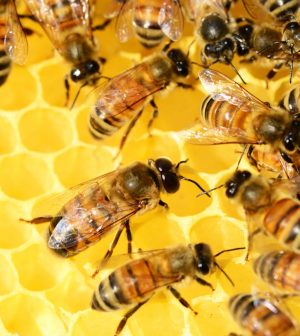- Do you subscribe to Dharma Dog Training’s Newsletter? You should.
- A Unique Campaign from The Humane Society of the United States
- Rabid bats in Omaha- Stay safe, prepared with these tips
- Springtime Activities in Omaha
- Mill Dog Monthly from Bailing Out Benji
- World Spay Day, Legislative Alert in Nebraska
- Attend the Nebraska Rescue Council’s monthly meeting this Saturday
- Five Hard-to-Ignore Reasons to Adopt!
- Paws in Pink to Benefit Breast Cancer Foundation
- VCA, Inc. Acquires MidWest Vet Specialists from Kansas State University
4 Interesting Facts About Bees Everyone Must Know

A healthy environment and economy depend on bees. They and other insects are responsible for pollinating most of the fruits and vegetables humans consume. You must have seen them flying during the day, but can bees fly at night? Yes, some species of them do indeed fly at night. They have developed night vision and actively hunt for food.
Bees produce honey and pollinate crops, but these buzzing insects do much more. Have a look at some of the fun and exciting facts about them.
There Are Certain Health Benefits To Bee Stings.
Your skin and immune system may benefit from the potent anti-inflammatory qualities of bee venom. Additionally, it might help with ailments including chronic pain. Melittin is found in bee venom, and it can shield against HIV. Additionally, their stings can also help relieve the discomfort from rheumatoid arthritis.
Some Bees Fly At Night
Most bee species only fly during the day. Due to the difficulty of seeing and avoiding obstacles in the dark, they are regarded as diurnal and only engage in foraging during the day. However, can bees also fly at night?
You will be surprised to know that there are a few uncommon kinds, such as tropical wasps, that can fly in total darkness and low light. The ability to see and fly at night has evolved in these nocturnal insects, primarily in tropical species. Some flowers, like moonflower and night-blooming jasmine, conveniently bloom only at night.
The reasons why some species fly at night can be divided into two fundamental theories. The first justification relates to less competition. Because there are fewer nocturnal bees and other insects, they are not forced to compete for food with most insects. Typically, you can see a nocturnal bee in forests or similar dense environments.
The ability to fly at night allowed the nocturnal bee to forage on blooms that generate nectar during and at night. Day-active bees are continuously under threat from parasites and predators. Additionally, the ability to fly at night gave them a practical means of escape, and they could feed freely.
Their Brain Chemistry Changes When They Switch Jobs.
Bees have specific functions hardwired into them, and they function accordingly. For example, scout bees are naturally adventurous and look for new food sources. Also, there are soldier bees who serve as security guards. But one percent of all adult bees develop the brain pattern which drives them to remove dead bees from the hive. Most impressively, though, ordinary honeybees who work a variety of occupations during their lifetime—will alter their brain chemistry before beginning a new position.
They Helped Revolutionize The Field Of Medicine.
Bees use propolis, a substance derived from evergreen and poplar trees, to strengthen their hives. Essentially, it is beehive glue. Although they use the resin as a caulk, humans use it to keep fungus, viruses, and germs off. According to studies, propolis from a beehive helps treat eczema, canker sores, herpes, cold sores, sore throats, and cavities.
Aging bees’ brains prevent aging when they perform tasks typically performed by younger bees. Their brain ages backward. This discovery, according to scientists, may be able to delay the onset of dementia.
Conclusion
Bees are vital for the health of humans and the environment. These are some exciting facts about these unique insects that make them amazing winged insects. They are essential for food production because of their role as pollinators and the medical benefits of honey and other goods.
Latest News
-
3 Tips for Pet Owners on Training Rescue Dogs
Owning a rescue dog can take some work compared to...
- Posted 1 week ago
- 0
-
Choosing the Right Pet for Your Lifestyle
Are you thinking about getting a pet but unsure what...
- Posted 3 weeks ago
- 0
-
How to Make Your Rescue Pet as Comfortable as Possible
Did you bring home a new pet from a shelter...
- Posted 2 months ago
- 0
-
How Having A Pet Can Change Your Life
Having a pet can open your heart in ways that...
- Posted 7 months ago
- 0
-
How To Improve The Life Of Your Senior Pet
Do you have an elderly fur baby and want to...
- Posted 7 months ago
- 0
-
Springtime Activities To Enjoy With Your Furry Friends
Are you preparing for warmer weather and want some ideas...
- Posted 8 months ago
- 0
-
Pros And Cons Of Microchipping Your Pets
Have you considered whether your pets should be microchipped and...
- Posted 9 months ago
- 0


















You must be logged in to post a comment Login